 Petzlover
Petzlover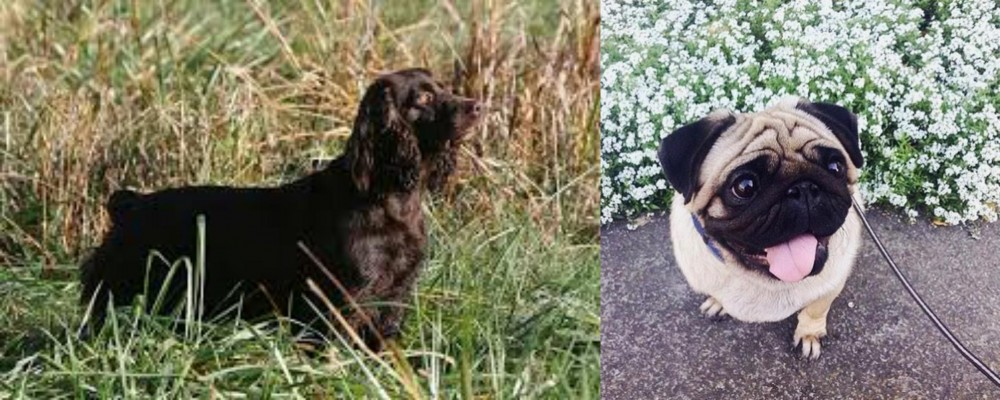 Boykin Spaniel is originated from United States but Pug is originated from China. Boykin Spaniel may grow 10 cm / 4 inches higher than Pug. Boykin Spaniel may weigh 9 kg / 20 pounds more than Pug. Both Boykin Spaniel and Pug has almost same life span. Both Boykin Spaniel and Pug has almost same litter size. Boykin Spaniel requires Moderate Maintenance. But Pug requires Low Maintenance
Boykin Spaniel is originated from United States but Pug is originated from China. Boykin Spaniel may grow 10 cm / 4 inches higher than Pug. Boykin Spaniel may weigh 9 kg / 20 pounds more than Pug. Both Boykin Spaniel and Pug has almost same life span. Both Boykin Spaniel and Pug has almost same litter size. Boykin Spaniel requires Moderate Maintenance. But Pug requires Low Maintenance
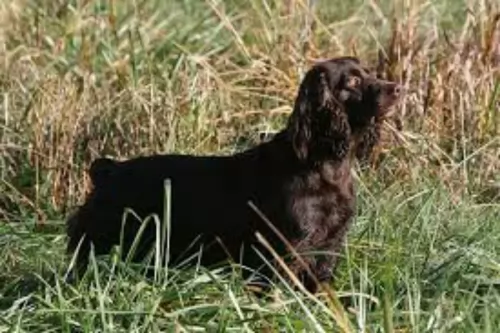 The Boykin Spaniel was originally bred by South Carolina hunters as the perfect dog for hunting wild bird during the early 1900s. Alexander White of Spartanburg found a short, well built dog and named him Dumpy. The dog was given to a certain L. Whitaker Boykin and a similar dog in looks was found and mated with Dumpy on Boykin’s Pine Grove plantation. Whitaker Boykin was particularly looking for a special kind of hunting dog breed that could wade into swamplands and into water.
The Boykin Spaniel was originally bred by South Carolina hunters as the perfect dog for hunting wild bird during the early 1900s. Alexander White of Spartanburg found a short, well built dog and named him Dumpy. The dog was given to a certain L. Whitaker Boykin and a similar dog in looks was found and mated with Dumpy on Boykin’s Pine Grove plantation. Whitaker Boykin was particularly looking for a special kind of hunting dog breed that could wade into swamplands and into water.
Boykin’s spaniels were popular in South Carolina before World War II and later, in 1977, the Boykin Spaniel Society was founded to ensure the breeding standards of the dog. In 1985, the Boykin Spaniel was declared the state dog of South Carolina and recognized by the American Kennel Club in 2009.
 It is believed that Pugs originated in China, but not much is known about the early history of these dogs. There are some dog experts who believe that the dogs were brought to Holland by Portuguese traders in the 16th century.
It is believed that Pugs originated in China, but not much is known about the early history of these dogs. There are some dog experts who believe that the dogs were brought to Holland by Portuguese traders in the 16th century.
These dogs then went from Holland to England in 1689. The American Kennel Club registered the Pugs in 1885.
In 1931, the Pug Dog Club of America was established.
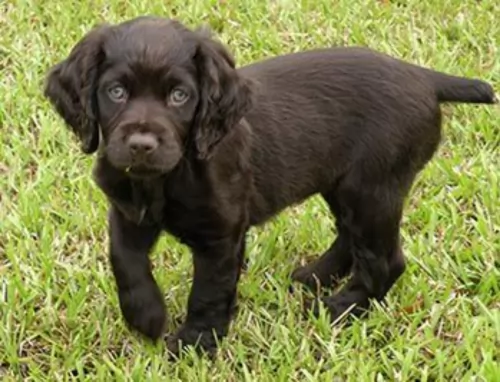 You can’t miss the medium-sized Boykin Spaniel with his magnificent coat in different shades of brown. When he gleams in the sun he looks like chocolate. This type of Spaniel is a bit bigger than the English Cocker Spaniel, but he is heavier, weighing between 13 to 18kg. He has large, floppy feathery ears and the tail has always been docked to give him that distinct look, but now with rules and regulations, the tail is often left so that it is long and feathery. The height of this dog at the withers is 39 to 43cm.
You can’t miss the medium-sized Boykin Spaniel with his magnificent coat in different shades of brown. When he gleams in the sun he looks like chocolate. This type of Spaniel is a bit bigger than the English Cocker Spaniel, but he is heavier, weighing between 13 to 18kg. He has large, floppy feathery ears and the tail has always been docked to give him that distinct look, but now with rules and regulations, the tail is often left so that it is long and feathery. The height of this dog at the withers is 39 to 43cm.
The length of the dog’s coat varies somewhat because of the different breeds from the past. Essentially the coat is medium length and wavy to curly with light feathering around the legs, ears, chest and stomach.
The Boykin Spaniel is social and he makes an excellent family pet. He is good around children and other dogs, and with training and socialization he becomes even more amicable and obedient.
 Pugs are small dogs standing at roughly 25cm and 36cm in height and weighing between 6 and 8.5kg. They are categorized as a toy breed.
Pugs are small dogs standing at roughly 25cm and 36cm in height and weighing between 6 and 8.5kg. They are categorized as a toy breed.
The head is large in size compared to the body. It’s the eyes which are quite distinct – being particularly large and prominent, almost bulging. The face is fairly wrinkled too with the muzzle being short or blunt and black in color.
The coat of the dog is smooth and short with colors mainly being fawn, but black is also seen. The ears are medium sized and floppy while the tail curls up tightly over the back.
The Pug is unusual to look at and also has an unusual personality. He is an entertaining dog with his clownish antics but he happens to be intelligent too, and will respond well to training and socialization.
With their short coats they are regarded as low-maintenance dogs, although the short, double coat does shed quite a bit. They’re also not your typical live-wire and can quite easily be found lounging around.
Of course they can’t be left to do this too often as obesity can easily set it. Pugs will certainly need some physical exercise and mental stimulation. They’re playful dogs and get on well with children and other pets, especially if there are games to be enjoyed.
They are loyal, affectionate pets with their human owners and make a good pet for those living in the city or in the countryside.
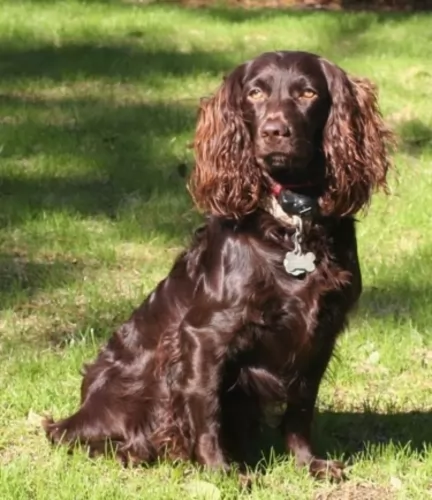 The Boykin Spaniel is a diverse breed. The characteristics of the dog aren’t set in stone. He is a hunting dogs with boundless energy and enthusiasm. He is an intelligent breed and responds well to training and is obedient to your commands. He is all about fun and excitement and he is guaranteed to make a splendid companion.
The Boykin Spaniel is a diverse breed. The characteristics of the dog aren’t set in stone. He is a hunting dogs with boundless energy and enthusiasm. He is an intelligent breed and responds well to training and is obedient to your commands. He is all about fun and excitement and he is guaranteed to make a splendid companion.
Active and social, he is going to need input from his owners in terms of exercise and mental stimulation. He isn’t a dog to just ignore and in exchange for love and care, he is going to be a loving, loyal and fun companion for you.
 The Pug just loves spending time with his human family. They’re good with other dogs too and with children.
The Pug just loves spending time with his human family. They’re good with other dogs too and with children.
They’re even tempered and will make anyone a splendid family pet, so long as they’re not heavy into things like jogging and cycling.
He is alert and can make you a good watchdog. With all the love he comes with, the comical Pug can make you a most wonderful pet and friend.
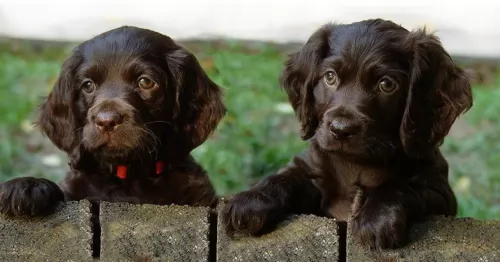 The Boykin Spaniel is a healthy breed with a life span of 14 to 16 years. There are some diseases that you want to be aware of with your Boykin Spaniel.
The Boykin Spaniel is a healthy breed with a life span of 14 to 16 years. There are some diseases that you want to be aware of with your Boykin Spaniel.
Always be aware of Hip Dysplasia as it can reduce your pet’s quality of life.. In dogs with hip dysplasia, the hip joint doesn’t to develop properly and deterioration sets in and your pet can lose function of the joint. You’ll notice your pet battling to stand up after lying down. The frightening this is that some dogs begin to show signs of hip dysplasia as early as 4 months of age.
The Boykin Spaniel’s most common health problems apart from hip dysplasia are patellar luxation and juvenile cataracts.
 Every dog, regardless of breed, can develop health problems. Good nutrition, exercise and love and care go a long way to ward off diseases and ensure your pet has a healthy, happy life.
Every dog, regardless of breed, can develop health problems. Good nutrition, exercise and love and care go a long way to ward off diseases and ensure your pet has a healthy, happy life.
The Pug can also develop certain health problems and we look at one or two -
This is inflammation of the brain and it causes seizures. Unfortunately there isn’t a cure. This neurological disease is luckily rare. Usually it attacks young Pugs of 2 or 3 years of age. Seizures, neck stiffness, loss of co-ordination, lethargy are all signs of this disease.
Sad though it may be, the best way forward would be to put your dog to sleep, but in any case your vet will discuss all options with you.
With this disease, your Pug can have breathing problems, which can be aggravated if the Pug is overweight or the weather particularly hot. Don’t exercise your Pug too vigorously on a hot day.
Stenoic nares is a medical term for narrow nostrils in a dog, and this is precisely what the Pug battles with. If the Pug battles too much with breathing problems, corrective surgery is possible.
Pugs often have to contend with some serious dental problems, and this is because their teeth are crowded. He may require more dental attention than other dogs.
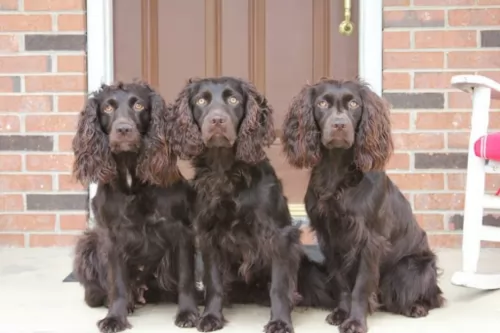 The Boykin Spaniel has been a gun dog and because he is energetic, he will need plenty of exercise and activities. Take him for walks or allow him to swim in the farm dam if you live in the country. He isn’t a dog to leave on his own in your backyard as he needs exercise as well as mental stimulation to keep him from becoming frustrated and developing destructive habits.
The Boykin Spaniel has been a gun dog and because he is energetic, he will need plenty of exercise and activities. Take him for walks or allow him to swim in the farm dam if you live in the country. He isn’t a dog to leave on his own in your backyard as he needs exercise as well as mental stimulation to keep him from becoming frustrated and developing destructive habits.
The Boykin’s hair will need to be brushed as least twice a week to prevent it from matting, particularly if he is a country-living dog, in and out of water and running through long grass. He is not a heavy shedder but his shedding is seasonal. As a long eared dog, he will need to have his ears checked to prevent infection.
Other grooming habits to get used to with your Boykin Spaniel are having his nails trimmed and brushing his teeth at least 2 or 3 times a week with special dog toothpaste and brush.
Boykin Spaniel owners who know the breed well say that there is nothing better than feeding your dog raw meat with vegetables and rice. Of course, not everyone can afford to feed their pets raw meat every day, and that’s alright. Just make sure that every now and then you include raw meat into your pet’s diet.
The very best commercially produced dog foods can also be good for your pet. If in doubt, speak to your veterinarian about the best food for your active, energetic pet. Never, ever deprive your pet of fresh, cool water throughout the day and night.
 Grooming your Pug’s coat will simply require a brush twice a week. They’re fairly heavy shedders these Pugs so you can’t neglect the brushing.
Grooming your Pug’s coat will simply require a brush twice a week. They’re fairly heavy shedders these Pugs so you can’t neglect the brushing.
It’s your chance to check the inside of his ears for signs of redness and to also check that his eyes are alright. You’ll also need a damp cloth to wipe his face and get rid of debris caught in the wrinkles. Run your hands over his body and make sure there aren’t any unusual new lumps. Keep his nails trimmed too.
Your Pug will need the best food there is to give his health the best chance. Remember that if you buy commercially manufactured dog food, to buy the very best one there is. Some of the poorer quality ones don’t come with the right balance of vitamins and minerals, and they also have lots of bad colorants and preservatives.
Also, be careful to read the packaging. Your Pug is a toy breed so you can’t be buying him food for large breed dogs such as Mastiffs or German Shepherds.
Consistency and simplicity is what your Pug wants from you. Home-made food is always an excellent choice for your pet’s diet. Boiled chicken, brown rice or pasta and spinach, sweet potatoes and carrots can be very healthy for him. For your Pug, chop it all up and maybe twice a week add it into the dry kibble.
Some raw meat added in occasionally will also ensure his good health. Always make sure he has access to fresh, cool water.